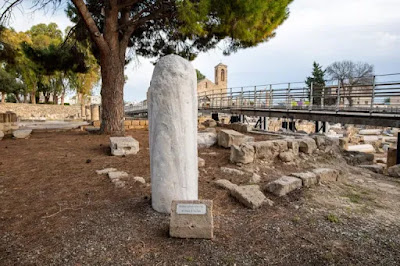Filenews 24 June 2024 - by Dora Christodoulou
And now officially Pafos has recognition of its primary importance in the coming of the Apostle of Nations in Europe, through the certification and registration of the cultural-religious route "In the footsteps of Apostle Paul, Apostle of the Nations". Through a process that lasted more than two years, the tourism bodies of the Pafos district are now officially claiming certification and registration of this route in the European Routes (Cultural Routes of the Council of Europe).
The Cultural Routes are powerful tools for the promotion and preservation of the common and different cultural identities of the European Union and for the whole district of Pafos, culture is a strong competitive advantage and therefore places particular emphasis on this area.
The steps of Apostle Paul in Pafos have been the focus of the efforts of Pafos tourism operators for the development of religious tourism in the province for several years now. This effort had temporarily received a particular impetus several years ago, when the area of St. Paul's Column in Kato Pafos was visited by the then Pope Benedict, as part of his official visit to Cyprus. However, the results in terms of development of the religious tourism industry were negligible thereafter.
However, the combination of recreation with pilgrimage to the parts of the Mediterranean through which Apostle Paul passed and preached, continues to be one of the main objectives for the authorities of Pafos in the matter of tourism development and promotion of the province. The development of religious tourism, according to the plans, will have as a point of reference the steps of Apostle Paul in the framework of the MedMission program, which deals with the protection and promotion of Mediterranean stations and the promotion of the religious and cultural importance of the Apostle's course.
In 45 AD, the two Apostles Paul and Barnabas, accompanied by Mark, travelled from Antioch to Silesia and from there by ship to Cyprus where they reached Salamis, which at that time was the largest port on the island. In Pafos, they managed to convert the Roman proconsul, who converted to the Christian faith. In this way, Cyprus became the first country in the world to be ruled by a Christian.
According to tradition, when Apostle Paul arrived in Pafos and began his preaching, the pagans tied him to a column and punished him with thirty-nine sticks. One of the columns located in the courtyard of the church of Agia Kyriaki is today known as the Column of Apostle Paul.
St. Paul's Column is one of the popular stops of pilgrims who come to see the religious sites of this early bastion of the Christian faith. Paul, though not part of the closed circle of Jesus' disciples, became an Apostle by divine call and thus took on the heavy burden of spreading the gospel. Paul was lucky as he combined three very important elements for the role he had undertaken. First, he was Jewish and therefore characterized by fighting spirit and stubbornness. Second, he had a Greek education, spirit and soul, and third, he was a Roman citizen, able to travel freely in a vast empire that reached the limits of the then known world.
